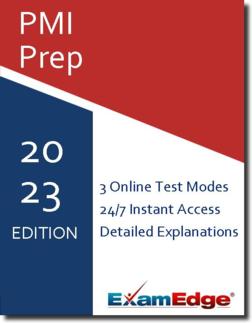PMI Exam & PMI Certification Info
The Project Management Institute (PMI) is a global non-profit professional organization for project management with headquarters in the United States. PMI provides various certifications for project management professionals, including the globally recognized Project Management Professional (PMP) certification. These certification exams validate your competency in handling the demands of project management roles.
Step 1: Eligibility and Application
First, you check your eligibility for the PMI certification you are interested in. For example, the PMP certification requires a minimum of 3 years of project management experience, along with 35 hours of project management education. Once you meet the eligibility criteria, you can apply for the certification exam through the PMI website.
Step 2: Scheduling the Exam
Once your application is approved, PMI will send you an eligibility code. You can use this code to schedule your exam through Prometric, the testing service that PMI uses. You can choose the date and location that works best for you. Exams can be taken at a physical Prometric testing center or online.
Step 3: Taking the Exam
On the day of the exam, arrive at the testing center early, or if you're taking the exam online, ensure you have a quiet, uninterrupted environment. The PMP exam consists of 180 questions and takes about 230 minutes to complete. Once you've completed the exam, you'll receive your results immediately.
For more information about PMI and their certification exams, you can visit their website at https://www.pmi.org/. The website provides detailed information about the different certifications, eligibility requirements, exam details, and more.
Project Management Institute Exams
The PMI Certified Associate in Project Management (CAPM) certification exam is a rigorous test offered by the Project Management Institute (PMI). This exam evaluates an individual's understanding and application of project management principles, methodologies, and best practices. It includes 150 multiple-choice questions covering key areas such as project scope, quality, cost, time management, and communication. The CAPM certification is globally recognized and is ideal for those seeking to enhance their project management skills and improve their employment prospects in the field. It requires a secondary degree and 23 hours of project management education.
The PMI Portfolio Management Professional (PfMP) certification test is designed to assess the knowledge and skills of professionals in managing multiple portfolios to achieve strategic objectives. This test covers five key areas: strategic alignment, governance, portfolio performance, portfolio risk management, and communications management. It requires a high level of expertise and experience, with eligibility criteria including a secondary degree, 10,500 hours of portfolio management experience, and 6,000 hours of project or program management experience. The PfMP certification validates one's ability to effectively manage and align portfolios with organizational strategy.
Governance - 20%
Portfolio Performance - 25%
Portfolio Risk Management - 15%
Communications Management - 15%
The PMI Professional in Business Analysis (PMI-PBA) certification test is a globally-recognized exam for business analysis professionals. It assesses individuals' competency in defining requirements, shaping project outputs and driving intended business outcomes. Covering five domains including needs assessment, planning, analysis, traceability and monitoring, and evaluation, the test ensures candidates possess the necessary skills to effectively work on projects and manage requirements or product development. Successful candidates are able to provide a valuable link among stakeholders, solution teams, and project management. PMI-PBA certification represents high proficiency in business analysis principles.
Planning - 22%
Analysis - 35%
Traceability and Monitoring - 15%
Evaluation - 10%
The PMI Program Management Professional (PgMP) certification test is a globally recognized exam, designed to validate the advanced skills and experience of program managers. It evaluates a candidate's ability to manage multiple, related projects and align them to organizational goals. The test covers five performance domains: program strategy alignment, program benefits management, program stakeholder engagement, program governance, and program life cycle. The PgMP certification test requires a blend of theory and real-world scenarios to ensure a comprehensive understanding of program management.
The PMI Project Management Professional (PMP) certification test is a globally recognized, rigorous, examination-based professional designation for project managers. The exam assesses the candidate's knowledge and skills in initiating, planning, executing, controlling, and closing a project. The PMP certification is designed to ensure that certified professionals possess the necessary competencies to lead and direct projects, and is regarded as a high standard of project management. The exam consists of 200 multiple-choice questions, and it requires extensive preparation and understanding of both practical and theoretical aspects of project management.
Planning - 24%
Executing - 31%
Monitoring and Controlling - 25%
Closing - 7%
The PMI Risk Management Professional certification test is a globally recognized exam designed for project managers seeking to specialize in identifying and assessing project risks. It covers risk management strategies, risk planning, risk monitoring, and communication. Candidates must demonstrate knowledge of risk management concepts, principles, and the ability to apply them in real-world situations. The exam is computer-based, consisting of 170 multiple-choice questions. A bachelor's degree, 30 hours of risk management education, and at least 3,000 hours of project risk management experience are prerequisites for the test.
Stakeholder Engagement ( - 19-20%
Risk Process Facilitation - 25-28%
Risk Monitoring and Reporting - 19-20%
Perform Specialized Risk Analyses - 14-16%
The PMI Scheduling Professional (PMSP) certification test is a globally recognized examination administered by the Project Management Institute (PMI). It validates one's expertise in project scheduling, task coordination, and risk mitigation. The exam measures a candidate's ability to develop, maintain, analyze, and communicate a project schedule, ensuring that projects are completed within time and budget constraints. Candidates with PMSP certification are highly valued in sectors like construction, IT, and manufacturing where project scheduling is crucial. The test consists of 170 multiple-choice questions, covering both practical and theoretical aspects of project scheduling.
Schedule Planning and Development - 31%
Schedule Monitoring and Controlling - 35%
Schedule Closeout - 6%
Stakeholder Communications Management - 14%

